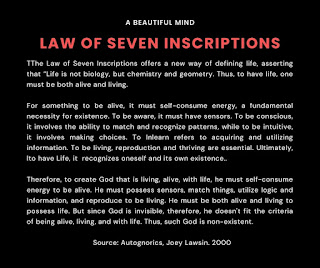The Easy Solution of Consciousness is a scientific argument formulated by Joey Lawsin that argues the consciousness does not exist. The claim is based on Newton's laws of motions.
The computational argument of the soul explores the idea that non-material entities, like god, consciousness, mind, emotions, and the soul that emerges only from physical processes, cannot exist independently in the ethereal realm without the corporeal body.
According to Joey Lawsin, who formulated the Computational Argument through his theory of Autognorics, the examination of consciousness within the frameworks of classical and modern physics, particularly using Newton’s Second Law, provides irrefutable evidence that consciousness and all related phenomena will never manifest in either the material or immaterial worlds.
Lawsin's argument hinges on the application of Newton's Second Law, which states that force is equal to mass times acceleration (F = ma). He posits that if god, the soul or consciousness were non-material and had no mass, it would not experience force or acceleration, and thus could not exist independently of the physical body. Thus, when the mass is equal to zero (m=0), then the Force F will be zero as well. Without force there will be no motion.
This means that if the soul, a non-material being with consciousness, can float freely everywhere, this means that it is unaffected by gravity. This implies that it has no mass or weight. Without mass, it cannot experience force or acceleration, and thus, it lacks the capability to move around.
Consequently, upon death, while the body ceases to function, the soul remains at the location of death. Given the Earth’s orbit around the sun, the soul would be left floating in space as the Earth moves away from the position of the deceased.
By leveraging Newton’s Second Law, it provides a comprehensive understanding of the interactions, or lack thereof, between consciousness and the physical world. Through this computation, the ongoing dialogue between metaphysical concepts and empirical science, offers new insights into one of humanity’s oldest questions.
Scientific methods, which depend on observable and measurable phenomena, exclude consciousness from their criteria. Neuroscience reveals that thought, emotion, and personality are intricately linked to brain activity. The theory of evolution, which elucidates the development of complex life forms, does not require the concept of consciousness. Additionally, consciousness and self-awareness can be fully explained by the novel seven criteria of life defined in Autognorics and do not require a soul. Collectively, these arguments invalidate the traditional notions of the soul, mind, consciousness, and the non-material essence of a person that are often thought to survive the death of the body .
Other theories include:
1. Materialist Theories: Lawsin's view aligns with materialist theories, which argue that consciousness arises from physical processes in the brain. Materialists believe that consciousness cannot exist independently of the brain, similar to Lawsin's argument that non-material entities like the soul cannot exist without the physical body.
2. Dualist Theories: Dualism, famously advocated by René Descartes, posits that the mind and body are separate entities. This is in direct contrast to Lawsin's view, as dualists believe that consciousness (or the soul) can exist independently of the physical body.
3. Information Integration Theory (IIT): IIT, proposed by Giulio Tononi, suggests that consciousness arises from the integration of information within a system. While IIT focuses on the complexity and integration of information, it does not necessarily require a non-material entity, which can be seen as somewhat compatible with Lawsin's materialist stance.
4. Quantum Theories: Some theories, like those proposed by Roger Penrose and Stuart Hameroff, suggest that consciousness involves quantum processes that are not fully understood. These theories imply that consciousness might have non-material aspects, which contrasts with Lawsin's purely materialist view.
5. Panpsychism: This theory posits that consciousness is a fundamental feature of all matter. Panpsychism suggests that even the smallest particles have some form of consciousness, which is quite different from Lawsin's argument that consciousness cannot exist without a physical body.
 |
#originemology, #codexation dilemma, #autognorics, #interim emergence, #inscription by design





















.png)




